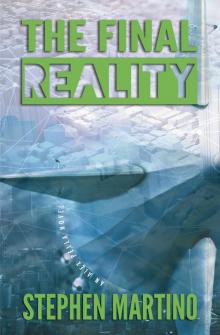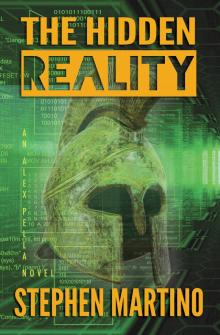- Home
- Stephen Martino
The Final Reality (Alex Pella, #3)
The Final Reality (Alex Pella, #3) Read online
Title Page
THE FINAL
Reality
AN ALEX PELLA NOVEL
Stephen Martino
Durham, NC
Copyright
Copyright © 2017, by Stephen Martino
The Final Reality
Stephen Martino
smartino.lightmessages.com
[email protected]
Published 2017, by Light Messages
www.lightmessages.com
Durham, NC 27713
Printed in the United States of America
Paperback ISBN: 978-1-61153-165-7
Ebook ISBN: 978-1-61153-164-0
Library of Congress Control Number: 2016956068
ALL RIGHTS RESERVED
No part of this publication may be reproduced, stored in a retrieval system, or transmitted in any form or by any means, electronic, mechanical, photocopying, recording, scanning, or otherwise, except as permitted under Section 107 or 108 of the 1976 International Copyright Act, without the prior written permission except in brief quotations embodied in critical articles and reviews.
This is a work of fiction. All characters and events appearing in this work are fictitious.
Table of Contents
Title Page
Copyright
Contents
Dedication
Prologue
Chapter 1 - May 2, 2086 - Philadelphia Art Museum
Chapter 2
Chapter 3
Chapter 4
Chapter 5
Chapter 5
Chapter 7 - Pumapunku, Bolivia
Chapter 8
Chapter 9
Chapter 10
Chapter 11
Chapter 12
Chapter 13
Chapter 14
Chapter 15
Chapter 16
Chapter 17
Chapter 18
Chapter 19
Chapter 20
Chapter 21
Chapter 22
Chapter 23
Chapter 24
Chapter 25
Chapter 26
Chapter 27
Chapter 28
Chapter 29
Chapter 30
Chapter 31
Chapter 32
Chapter 33
Chapter 34
Chapter 35
Chapter 36
Chapter 37
Chapter 38
Epilogue - 12 Months Later - Neurono-Tek Headquarters, Pennsylvania
Fact or Fiction?
Acknowledgements
The Author
Alex Pella Novels
Dedication
“My reading of history convinces me that most bad government results from too much government”
–Thomas Jefferson
Prologue
Prologue
October 4, 1944
Somewhere in the Tsang Po River Valley Southwest of the Tibetan Capital, Lhasa
Though accompanied by four other companions, Ernst Schäfer felt alone on the barren, salt-crusted sands of the Tibetan desert. Even now as he entered the drab brown mountain valleys once forged by a long-forgotten river, the change in scenery only proved to heighten his feeling of complete isolation from both humanity and his own self.
The pain of each footfall ignited his soles and exploded in his legs. Walking over thirty miles a day for the last month had certainly taken its toll on his body. Though almost paralyzed at times by the pain, he knew that the success of this mission made his personal suffering inconsequential.
“We must be getting close,” Ernst’s guide noted, pointing towards a few boulders on the ground, each with the word Tsan etched on them.
Ernst nodded in acknowledgement. Though limited in his Tibetan vernacular, he knew the word meant border. Serving as a warning as opposed to a designation of property lines, it was meant to frighten off any unwanted trespassers. Because most Tibetans were afraid of ghosts, spirits, or other supernatural beings, such a warning would scare even the most curious travelers who unknowingly stepped foot in this part of the valley.
“Thank you, Illion,” Ernst said.
“The City of the Initiates must be ahead,” Illion responded matter-of-factly. Dressed in a long sleeve wool gown known colloquially as a chu-pa with thick leather boots that fit snuggly up to the knees, their guide donned both himself and the rest of the expedition in the native garb of a Tibetan nomad.
Because of the war and the distrust towards Westerners, Ernst’s expedition was forced to travel undercover so as not to rouse local suspicion. They even had to lather their faces with a tincture of iodine and oil to disguise their fair skin.
“We must be entering The Valley of Mystery,” Illion added.
Well acquainted with Tibet, Illion had traversed the land alone and by foot about ten years prior to this expedition. In fact, he enjoyed such international popularity from his excursion that Ernst Schäfer sought him out one year earlier specifically for this mission. Though distrusting anyone who bore the SS skull and crossbones insignia on their uniform, Illion respected Schäfer for his groundbreaking botanical and zoological discoveries he had previously made in Tibet and agreed to be their guide.
Unlike the fifty-mule caravan, interpreters and porters who accompanied Ernst on his previous Tibetan expedition, this time, he brought a mere pittance of supplies in comparison. In fact, Illion needed to train both Ernst and the rest of the team to carry everything they needed, including food, personal needs, a tent, and some water underneath their chu-pas. It took nine months of grueling preparation in the lower-oxygen Scandinavian mountains, eating raw meat and drinking murky water disinfected with a hint of radioactive earth before Illion felt comfortable escorting the team into Tibet.
After all the training, there was still a significant risk of being captured while in British-controlled India, especially during the height of the war. With fake passports disguising their German origin, they were able to travel undetected even in the most well patrolled northeastern Indian region known as Sikkim. Once entering Tibet, they needed to hike by foot like desert nomads, without any beast of burden so that they would not draw the attention of the local authorities.
Ernst continued to walk next to Illion without saying another word while their four other undercover SS companions followed silently behind them. Selected from the purist of Aryan stock, Heimlich Himmler had personally recommended them for the mission.
Though no one in the expedition believed, like the Tibetans, in evil spirits, they each felt spooked by the eerie valley. As they entered, a thin white mist seemed to ooze up from the white sand and muffle all sound around them. Even their footsteps and the bustle of their chu-pas became more distant the further they walked. Though the sky was clear, the sun seemed to dim and the air chill.
Despite their harsh training, each member of the expedition could not help but give some credence to the local Tibetan myths and warnings about this valley.
What if evil spirits really did preside in the area? Could this place be cursed?
Though no one spoke it aloud, a chill ran through them. It was as if this whole area exuded some form of strange energy.
The valley widened in front of them, revealing a brown, circular stone wall about four feet high. As the group cautiously approached, they were able to understand its diameter to be about twenty-two feet; its stone slabs were most probably quarried from the local mountainside.
“Slowly,” Illion whispered. “You must show utmost respect upon entering this holy City of the Initiates.”
“Remember our objective,” Schäfer reminded the other four members of the group. Behind Illion’s back, Schäfer then nodded sp
ecifically to each of them, as if giving a signal.
The ground gently sloped downward from the centrally located wall. About 200 feet from the wall and spaced equidistant from one another were seven massive slabs of glass positioned around its perimeter. The sun glistened off their surface as if amplifying the dull light penetrating into the dried-up river valley.
“Not the city I expected,” Ernst mouthed to Illion. “Where are the houses? Where are the people?”
“There is much we don’t know about this place,” Illion responded. “Tibet still remains shrouded in mystery.”
Ernst and Illion walked over to one of the glass slabs. Upon their approach, the men noticed a long staircase descending into the Earth just in front of the slab. After closer inspection, it appeared that each of the other six slabs also had an adjoining staircase.
“The city must be underground,” Illion surmised.
Ernst gestured to the group to follow him as he walked over to the stone wall. The closer he approached, the more nauseated and lightheaded he became. Though his body willed him to stop, his mind pushed forward. The others joined him around the wall’s circular perimeter. They had trained too hard and endured too much already to be intimidated by the mounting queasiness.
Ernst looked over the wall. His face was met by a surprisingly cool breeze, which at first left him breathless and made his eyes water. After blinking a few times, he noticed the wall surrounded what appeared to be a deep pit.
Maybe a well?
Ernst took a loose stone from the wall and dropped it into the pit. Counting on his fingers, he attempted to estimate its depth by listening to when the stone struck bottom.
Ten seconds.
Making a fist with both hands, Ernst then started to count eleven as he raised his pointer finger.
Twenty seconds.
Ernst looked mesmerized at his companions as he then uttered, “Sixty,” a little louder and more robust than the other numbers.
“Chi la iru dung?” a voiced echoed from behind them, startling the entire group.
A distinguished man with a long, wrinkled face, large eyes and beaded white hair emerged from one of the staircases. Wearing a pure silk chu-pa embroidered with decorative, red designs, he sounded as if he were chastising a group of wayward children.
Illion walked over to the man and bowed for his forgiveness. As he was the only member of the team fluent in the native Tibetan tongue, Illion explained why he and his companions had entered the sacred city.
After a curt discussion, the man in the silken chu-pa abruptly turned and descended the staircase.
Before Ernst could ask Illion any questions, one-by-one men, women, and children began exiting different staircases around the courtyard. Unlike the first man, these inhabitants wore drab, cotton chu-pas and walked almost mechanically along the desert sand. Their faces were devoid of expression and appeared at times grotesque in nature. Even the children seemed to be lacking a soul, conducting their chores as if programmed by some omnipotent being that resided in the city. None noticed the visitors amongst their midst.
Illion could not help but draw a comparison between these lifeless human robots and the four soulless SS killing machines who accompanied him on this mission. Was there any difference?
An occasional handsome man or woman would exit one of the staircases. Unlike their other counterparts, they wore an ornate silken chu-pa and seemed to control the drably dressed inhabitants with a simple nod of the head or glance in a particular direction. All remained silent.
The scene reminded Ernst of a colony of ants.
Illion slowly walked over to Ernst, avoiding eye contact with the other city inhabitants. Leaning over ever so slightly, he then whispered, “The man said he had received no word that any visitors were expected.”
Ernst gulped deeply, gravely concerned now about the success of their mission. The news set his heart racing.
Had they not received the shipment? Was he duped?
Ernst could not but help replay in his mind everything that had transpired since he last visited Tibet in 1938, just prior to the breakout of the war. While in the capital city of Lhasa, he had met with a top-ranking governmental official by the name of Reting Rinpoche. Concerned about Russian oppression of the Buddhist religion and possibly even military aggression by the communist nation, Rinpoche had urgently requested an arms deal with the Nazi regime.
For an exchange of weapons, Rinpoche promised Ernst proof of an ancient Aryan culture and access to some of their most sacred texts containing powerful knowledge long forgotten by humanity. It was at that time that Rinpoche informed Ernst about the City of the Initiates and the secrets it possessed. As a high-ranking member of the fraternity known as The Holy Brotherhood who supposedly controlled the City of the Initiates, Rinpoche personally assured that he could grant access to the knowledge about an ancient Aryan race.
Without authority to broker a deal himself, Ernst politely informed Rinpoche that this proposal would be sent to the himself.
As the war progressed, Ernst assumed that the message had been lost in a bureaucratic mess, forgotten by both the SS and the Nazi Ancestral Heritage Foundation, known as the Ahnenerbe. However, as the German war machine ground to a halt on both fronts, Hitler himself commissioned Ernst’s Tibetan expedition in the hopes that some lost Aryan technology or scientific information could be uncovered in Tibet and win him the war.
After a brief moment, Illion then added, “He went to discuss our presence with Lha-mo-chun.”
“Who?” Ernst whispered.
“The little goddess,” Illion answered. “She is the caretaker of these grounds.”
The pair waited patiently while the four SS soldiers surrounded their position as if expecting an ambush.
“Must we keep with formalities?” Illion asked.
Ernst ignored the question, indignant to the man’s ignorance and his lack of urgency. Despite the propaganda, the war was proceeding very poorly for Germany on both its Eastern and Western fronts. With the Allied forces overtaking the Siegfried Line and advancing eastward by the day and the Russians closing in on them with their westward assault, Germany was on the brink of a catastrophic defeat. Not only would his country be left a desolate wasteland, but after selling his soul to Himmler and the SS, Ernst knew his career would fair no better after the war.
After about a half hour of waiting, a beautiful young woman with long dark hair braided into a single strand behind her head, high cheekbones, large brown eyes, and a radiant olive-hued complexion ascended one of the staircases. Wearing a pure white chu-pa, she made a breathtaking appearance.
“Welcome to our city,” she surprisingly greeted in Ernst’s native tongue. “Reting Rinpoche notified us that we should be expecting you.”
Success! Ernst let out a large sigh of relief. Rinpoche must have received the weapons.
“Then I assume you understand the nature of our arrival,” Illion responded as he bowed in respect to their new host.
With a smile that proved only to accentuate her beauty, she replied, “Let me assure you that we entombed the body of your fallen compatriot with the utmost respect.” Like a feather she raised her flowing arm and pointed to an adjacent staircase next to where they were standing. “Please let me escort you over to the Lha-Khang complex.”
Lha-mo-chun walked away as if gliding on the sand. Side by side with Illion, she led them to the staircase.
Again, Ernst nodded to his companions. Upon his signal, they began to adjust what they had hidden underneath the long sleeves of their chu-pas.
Lha-mo-chun turned back to the rest of the group. “Your friend is buried on the second level of our temple complex.”
“What is on the other levels?” Ernst asked, hoping to find the answer that Reting Rinpoche had promised.
While descending the stairs, the little goddess responded while looking directly ahead at the arched door. “The first level is where our monks prepare the recently deceased bodies for burial,
and the third is our most sacred temple, the Lha-Khang.” She bowed when speaking of the temple.
Lha-mo-chun pulled out a set of golden keys from underneath her white chu-pa. Before she could open the door, Ernst asked, “Have you ever been in the temple?”
She turned and with a smile said, “Only high-ranking members of the fraternity, the prince of the city, and I are allowed to enter the temple.”
Without further explanation, she unlocked the large door and opened it with little effort.
As the group entered, the intense glare of the light glistening through the glass ceiling initially blinded them. Once their vision came back into focus, they noticed another door at the end of a hallway along with other long corridors exiting all along the path.
I bet this whole complex is connected underground, Ernst deduced after viewing the layout.
“Please follow me,” Lha-mo-chun said as she escorted them down another staircase to a large arched doorway at the end of the hall. The glass ceiling above illuminated the area. Although not as bright as the first level, it provided ample visibility. “Your friend’s earthly body is behind here.”
“Thank you,” Illion responded. “If we may pay our last respects and collect his belongings, we will be on our way.”
Lha-mo-chun grabbed the keys once again from underneath her chu-pa. Before she could open the door, one of the SS soldiers clutched her hand while a second placed a knife to her throat.
Just as she was about to scream, the SS soldier with the knife placed his hand over her mouth and squeezed down on her face.
‘What are you doing?” Illion turned to ask Ernst, flabbergasted by what was transpiring. “What about the mission?”
“So naïve,” Ernst responded with a sadistic smile. “This is the mission.”
“But—” Illion started then stopped, realizing that he had been duped.
“The body behind this door was a plant,” Ernst continued. “A ruse to allow us access to the temple complex.”
One of the SS soldiers then took out a Lugar pistol from underneath his chu-pa and pointed it at Illion while another grabbed the keys from Lha-mo-chun.

 The Final Reality (Alex Pella, #3)
The Final Reality (Alex Pella, #3) The Hidden Reality (Alex Pella, #2)
The Hidden Reality (Alex Pella, #2) The New Reality
The New Reality